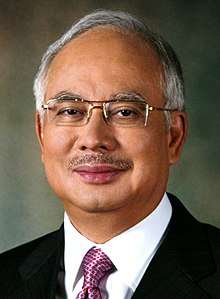Ewon Ebin
| Ewon Ebin | |
|---|---|
| Minister of Science, Technology and Innovation of Malaysia | |
| Prime Minister | Najib Razak |
| Preceded by | Maximus Ongkili |
| Succeeded by | Wilfred Madius Tangau |
| Member of Parliament for Ranau, Sabah | |
|
In office 2013–2018 | |
| Preceded by | Siringan Gubat |
| Succeeded by | Jonathan Yasin |
| Personal details | |
| Born | Sabah, Malaysia |
| Citizenship | Malaysian |
| Political party | United Pasokmomogun Kadazandusun Murut Organisation (2013–) |
| Other political affiliations | Barisan Nasional |
| Occupation | Politician |
Datuk Dr. Ewon Ebin was the Minister of Science, Technology and Innovation[1] (he was then replaced by Wilfred Madius Tangau in 2015) and the Member of Parliament for Ranau.[2] He was also then, the Sabah State Assemblyman, N31 Paginatan, Sabah after winning the Barisan Nasional (BN) ticket in the 2008 Malaysian General Election. He was one of 10 representatives of the United Pasokmomogun Kadazandusun Murut Organisation (UPKO) who competed in 2008.
His thesis at the University of Malaya 1978 was 'A Ranau Dusun Traditional Law Study in Sabah on Marriage, Divorce and Heritage'. He is very interested in the problems of natives in Sabah.[3] On 14 March 1994, he was involved in the Sri Gaya Resolution to establish the Sabah Democratic Party (PDS). The resolution was signed by almost all Parti Bersatu Sabah (PBS) representatives in Sri Gaya. Sri Gaya was the official residence of the then Sabah Chief Minister, Joseph Pairin Kitingan.
Political career
Illegal immigrants issues
On 11 January 2009, Sabah Industrial Development Minister Ewon reminded the JKKK about the tactics of illegal immigrants using a fake identity card to steal the aid of the native hardcore poor. Through home visits, the relevant parties can check the actual level of the applicant's poverty thus ensuring that their documents are valid or otherwise.
Rural aid
On 30 April 2010, Ewon as Sabah Rural Development Minister was present at the Sabah Sejahtera Award at Kampung Mansiang Community Development Center, Menggatal. Also present were Assistant Minister of Resources Development and Information Technology Development, Jainab Ahmad and Permanent Secretary of the Ministry of Rural Development, Ghulam Jelani. The winner is Kampung Tanjung Bulat, Kinabatangan - the state-level Sabah Sejahtera Award winner. Entilibon Village, Tongod (runner up) and Kampung Babagon Penampang (third). All winners receive prizes in the form of a project grant of RM50,000 for the champion, RM40,000 (runner-up) and RM30,000 (third).[4]
Elections
Since 1995, Ewon has been contesting in the Sabah election in Kundasang. In 1995 Ewon won with a majority of 939 votes. In the 1999 Election, Ewon was opposed by Ramdi Indang (Allied); Karim Bin Adam (PBS) and Benjimin Yasin (Setia). Kundasang's jurisdiction had 11,539 votes.
The previous State Assembly is known as Ranau and has 8639 voters. Ewon (BN/UPKO) 3,224, Janimin Saiun (Independent) 1,673; Ramli Indang (Independent) - 937; Henry Wan Kauting (Setia) 76 and Nayon Gudumi (Independent) - 69.[5]
In the next election, Ewon (PBS) received 4956 votes; Kasitah Gaddam (BN) gets 4,017 votes.[6]
In the 2008 election, Ewon (BN) received 5206 votes; Jahumin Ampadong (Allied) 157; Paul B. Kerangkas (PKR) 1,749 votes and Mat Jaili Samat (Independent) 90 votes. After the victory, he was appointed Sabah's Minister of Rural Development.
Election results
| Year | Government | Votes | Pct | Opposition | Votes | Pct | ||
|---|---|---|---|---|---|---|---|---|
| 2013 | Ewon Ebin (UPKO) | 15,434 | 49.2% | Jonathan Yasin (PKR) | 11,823 | 37.7% | ||
| 2018 | Ewon Ebin (UPKO) | 13,804 | 31.6%2 | Jonathan Yasin (PKR) | 14,880 | 34.0%2 | ||
| Notes: Table excludes votes for candidates who finished in third place or lower. 2 Different % used for 2018 election. | ||||||||
References
- ↑ KPI Report for MOSTI
- ↑ "Profile Ahli Dewan". Parliament of Malaysia. Retrieved 26 May 2018.
- ↑ Women in Southeast Asia: a bibliography,Kok-sim Fan,G.K. Hall, 1982, page 242
- ↑ Spearhead rural development
- ↑ Information Malaysia,Berita Publ. Sdn. Bhd, 2005, page 772
- ↑ Sabah's dilemma: the political history of Sabah, 1960-1994, Herman J. Luping, Magnus Books, 1994,page 490
- ↑ "Keputusan Pilihan Raya Umum Parlimen/Dewan Undangan Negeri". Election Commission of Malaysia. Retrieved 18 May 2018. Percentage figures based on total turnout (including votes for candidates not listed).
- ↑ "Sabah [Parliament Results]". The Star. Archived from the original on 18 May 2018. Retrieved 18 May 2018.
